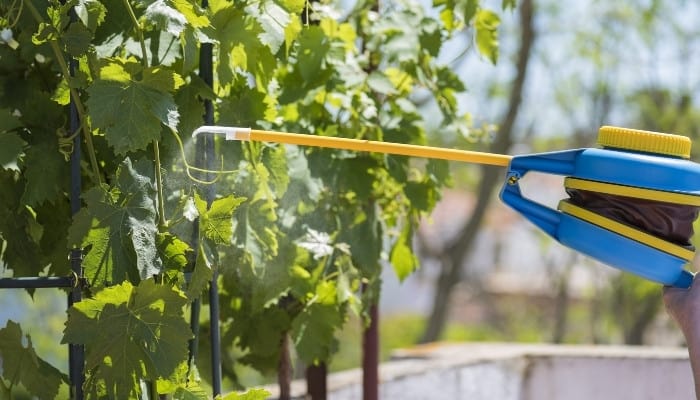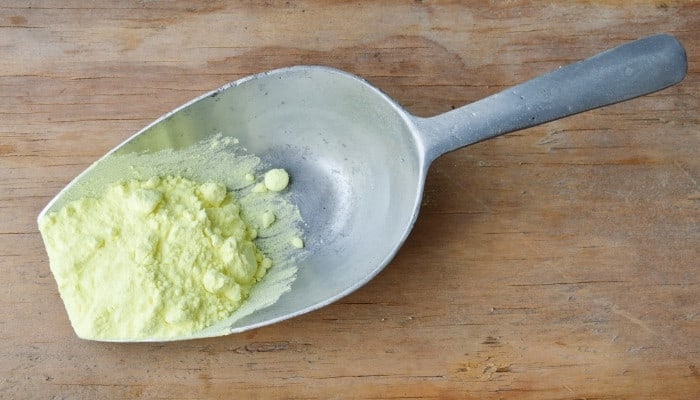Sulfur commonly has a negative reputation and is often linked to the unpleasant scent of spoiled eggs.
Actually, sulfur is one of the essential minerals necessary for plant growth (even though it is only needed in small quantities).
Without sulfur, plant growth can be stunted and health issues can arise.
What does sulfur powder do for plants? Sulfur helps produce necessary enzymes and plant proteins within the plant. Added to the soil, it can decrease the pH and sodium levels. Some plants, like mustard, onion, and garlic, need sulfur to produce flavor. Applied topically, it works as a fungicide and a pesticide.
Sulfur powder is easy to find online or in garden centers. It is a yellow powder. You can usually purchase a “dusting” version of the powder that has smaller particles designed for topical application.
Sulfur Powder for Plants
Sulfur powder is a quick and easy way to amend soil pH and feed this necessary mineral to plants. A soil application will typically keep sulfur levels appropriate for up to a year.
Sulfur Powder for Plants: Uses
Sulfur powder seems like a magical cure-all for gardening. Its many uses make it a must-have for any gardener. The uses for sulfur powder include:
- Fertilizer for plants.
- Reduce sodium content in soil.
- Fungicide.
- Acidify the soil.
- Pesticide.
- Add flavor to vegetables.
Is Sulfur Powder Good for Plants?
Yes, sulfur powder is good for plants. Not only can it improve the health of the plant internally, but it can also prevent pests and fungal infections from damaging the plant.
However, any mineral can become toxic when the concentration in the soil is too high. Apply according to package directions, and only use products that are more than 99% pure, like this one from Amazon.
Do Plants Need Sulfur?
Sulfur is an essential mineral for plant growth. Without it, plants will have stunted growth and can end up dying.
The initial sign of sulfur deficiency is the yellowing of younger leaves followed by older leaves.
How Do You Use Sulfur Powder for Plants?
For soil application, reference the dosage recommendation on your specific product.
In general, only a small amount of sulfur powder is necessary. Sprinkle the powder throughout your garden and gently mix it into the soil.
For topical application as a pesticide or fungicide, purchase a dusting sulfur powder that has smaller particles.
Apply this powder when the leaves of the plant are dry. You will most likely need to reapply after heavy rainstorms.
Is Sulfur Used as Fertilizer?
A fertilizer is anything added to soil to increase the fertility of the plants that live in the soil. Sulfur powder is a fertilizer because it is a necessary nutrient for plant growth.
Since sulfur is only necessary in small amounts, a single application of sulfur powder can act as a fertilizer for up to a year.
Does Sulfur Raise or Lower pH?
Sulfur acidifies (lowers the pH) the soil. If you are trying to lower the pH of your soil using sulfur powder, reference the directions on your specific product.
Depending on your soil’s current pH and the type of soil you have, the product will recommend a specific amount of sulfur powder to add to the soil.
Is Too Much Sulfur Bad for Plants?
Too much sulfur in the soil can create excess salts that are toxic to plants.
Unless you are applying large quantities of sulfur powder to the soil to significantly decrease the pH, you most likely won’t need to worry about excess sulfur in your plants.
Can Sulfur Burn Plants?
Excess sulfur in the soil that creates fertilizer salts can burn the roots of the plants. In addition, topically applied sulfur powder can burn the leaves in hot temperatures or direct sunlight.
To avoid burning the leaves, apply sulfur powder in the evenings and try to avoid use during the hottest part of summer.
Is Sulfur Safe for Organic Gardening?
Sulfur powder is made from pure sulfur that has been harvested from deposits in the earth. It is safe for organic gardening.
Just make sure that the product you are purchasing is 100% sulfur with no additives or fillers.
What Plants Benefit From Sulfur?
All plants need sulfur to grow, so they will benefit from sulfur powder if soil levels are low. Some vegetables, like onion, garlic, and mustard, need sulfur to become more flavorful.
Sulfur application is almost always necessary for seed-oil crops.
A lack of sulfur in the soil limits the crops’ abilities to uptake and utilize the other essential minerals: phosphorus, nitrogen, and potassium.
How Do You Use Sulfur for Powdery Mildew?
Use sulfur powder as a fungicide treatment for powdery mildew as soon as it is spotted. The powder is most effective when applied to dry leaves.
Since powdery mildew sets in after storms when the conditions are moist, reapply sulfur powder after rain. However, try to wait until the leaves are mostly dry before applying.

When Should I Apply Sulfur to My Garden?
If your garden does not show any signs of sulfur deficiency, sulfur powder can be added to your soil once a year.
If you are already applying a mixed fertilizer to your garden, check to see if it contains sulfur before you apply any powder. Excess sulfur can be toxic.
When you see signs of sulfur deficiency, especially when younger leaves are yellowing, you should apply a sulfur powder to the soil as soon as possible.
Only apply the prescribed amount listed on the container. Apply the powder onto the soil, and try to avoid any powder from sitting on the leaves of the plants.
If you are using sulfur powder as a treatment against pests or fungus, apply the product as soon as you see signs of an issue. The powder works best when applied to dry leaves.
Is Sulfur Good for Vegetable Plants?
Sulfur is good for vegetables because these plants generally prefer acidic soil. Depending on the type of vegetable plant, the preferred pH can be acidic (4.0-5.0) to mildly acidic (5.0-7.0).
In addition, sulfur is an essential nutrient for plant growth and plant protein production. Vegetable plants will not produce high yields if they are deficient in sulfur.
Is Sulfur Good for Tomato Plants?
Yes, sulfur is good for tomatoes. Not only is sulfur necessary for plant health and fruit production, but it also increases the flavor of the tomatoes.
Sulfur powder can also be used to combat pests and powdery mildew on tomato plants.
Is Sulfur Good for Pepper Plants?
Sulfur and magnesium deficiency are common in pepper plants, therefore sulfur powder can be added to fertilize the plants.
Sulfur also lowers the pH of the soil, which pepper plants prefer. To produce many flavorful peppers, sulfur is a necessary nutrient.
Can You Touch Sulfur?
It is recommended to wear gloves when handling sulfur powder because prolonged contact can irritate the skin.
Some people end up with rashes or calluses after handling sulfur powder. In addition, breathing in sulfur powder can irritate the nose, throat, and lungs as well as cause breathing issues.
How Do You Apply Sulfur to Soil?
The easiest way to apply sulfur powder to soil is to sprinkle it by hand. To protect your skin from irritation, always wear gloves when dispersing sulfur powder.
After applying the powder, gently work it into the soil without disturbing plant roots. The amount of sulfur powder you apply will depend on the goal of your application.
Reference the dosage chart on the container for directions on how much to apply to decrease the soil pH or for general fertilization.
Conclusion
This jack-of-all-trades should be in every gardener’s cabinet. Sulfur powder can not only nourish your plants but can also decrease the pH of the soil and fight off pests or fungus.
Your entire garden can benefit from a small amount of sulfur.

